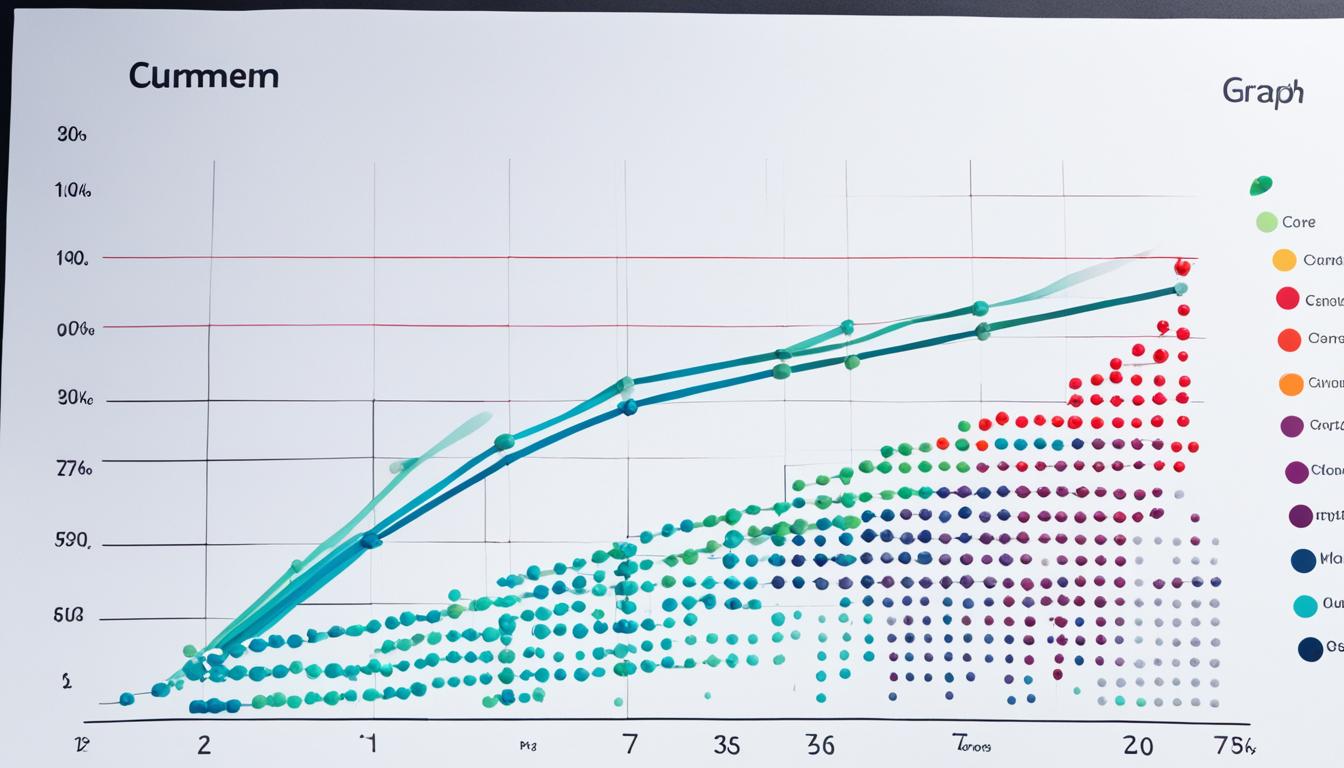Modern marketing goes beyond clever digital campaigns and innovative apps. It encompasses a range of strategies and techniques that adapt to the ever-evolving landscape of the marketing industry. To stay on top of current marketing trends, businesses must embrace innovative advertising methods and contemporary promotional tactics that resonate with their target audience.
According to a McKinsey survey, 83% of CEOs view marketing as a major driver for company growth. This reflects the importance of modern marketing in today’s competitive business environment. To achieve success, marketers need to rewire their departments for speed, collaboration, and a customer-centric focus. By doing so, businesses can unlock additional growth opportunities and reduce marketing costs.
Key Takeaways:
- Modern marketing encompasses a range of digital marketing strategies and techniques.
- Businesses must adapt to evolving marketing trends to stay ahead in the competitive landscape.
- Marketing plays a crucial role in driving company growth, according to 83% of CEOs.
- Modern marketing requires rewiring marketing departments for speed, collaboration, and customer focus.
- Embracing modern marketing techniques can unlock additional growth opportunities and reduce costs.
The Model for Modern Marketing
To modernize marketing and unlock its full potential, it is essential to have a clear view of a model for modern marketing. This model comprises various components that need to be transformed and modernized to achieve success in today’s digital landscape.
Marketing Capabilities
Modern marketing requires upgrading and enhancing marketing capabilities across different aspects of the marketing function. These capabilities encompass:
- Strategy & insights
- Creative & content
- Media & channel activation
- Customer experience & personalization
- Measurement & marketing ROI
- Product & pricing
- Organizational design & culture
Each of these capabilities plays a critical role in driving modern marketing and should be transformed to align with the needs and expectations of today’s consumers. By reimagining these capabilities, businesses can effectively engage with their target audience, deliver personalized experiences, optimize marketing strategies, and achieve measurable results.
Marketing Enablers
Transforming marketing organizations requires the implementation of various marketing enablers that support the modernization process. These enablers provide the necessary foundation and tools to drive successful modern marketing transformations.
- Advanced analytics and data-driven insights
- Marketing technology infrastructure
- Agile marketing methodologies
- Collaborative workflows and cross-functional teams
By leveraging these marketing enablers, businesses can enhance their agility, leverage data to make informed decisions, streamline workflows, and foster collaboration across different functions.
Transforming Marketing Organizations
Transforming marketing organizations requires a holistic approach that encompasses both capabilities and enablers. It is not enough to focus on one aspect without considering the others. By embracing the model for modern marketing, businesses can develop a clear roadmap for transformation, ensuring a comprehensive and successful modernization process.
With a commitment to the full suite of changes and a clear understanding of dependencies, businesses can navigate the transformation process effectively, avoiding blind spots, delays, and a loss of value. By adopting a modern marketing model, organizations can position themselves for success in the ever-evolving marketing landscape.
Mindsets: Thinking Like a Modern Marketer
Before embarking on a modern marketing transformation, three mindset shifts are necessary. These mindsets provide a foundation for change and enable modern marketers to drive successful transformations. Let’s take a closer look at each of these mindset shifts:
The Unifier Mindset
The unifier mindset involves collaborating with diverse areas of the company to drive growth. In today’s fast-paced business environment, it is crucial for modern marketers to unify different teams, such as sales, product, and customer service, to align their efforts towards a common goal. By fostering collaboration and breaking down silos, marketers can harness the collective power of the organization to create cohesive and impactful marketing strategies.
The Customer-Centric Mindset
The customer-centric mindset requires putting customers first and creating personalized experiences. In the era of digital transformation, customers expect brands to understand their needs and deliver tailored solutions. Modern marketers must adopt a customer-centric approach by gathering and analyzing data to gain insights into customer behavior, preferences, and pain points. By truly understanding their target audience, marketers can develop highly targeted campaigns and build strong customer relationships.
The ROI Mindset
The ROI mindset focuses on measuring and optimizing marketing activities to deliver value. In today’s data-driven world, it is essential for modern marketers to track the return on investment (ROI) of their marketing efforts. By leveraging analytics tools and performance metrics, marketers can gain valuable insights into the effectiveness of their campaigns and make data-backed decisions. The ROI mindset ensures that marketing strategies are continually optimized to drive maximum impact and achieve tangible results.
By embracing the unifier mindset, customer-centric mindset, and ROI mindset, modern marketers can navigate the ever-evolving marketing landscape and drive successful transformations. These mindsets fuel collaboration, customer focus, and data-driven decision-making, enabling marketers to stay ahead of the curve and deliver impactful results.
Enablers: Operating Like a Modern Marketer
In order to excel in modern marketing, it is crucial to upgrade and optimize four key operational enablers. These enablers are the driving force behind successful modern marketing strategies, allowing businesses to unlock their full potential and achieve growth. Let’s explore each enabler in detail:
1. Strategy & Insights
Strategy & insights form the foundation of modern marketing. By refining brand strategy and leveraging advanced analytics, businesses can gain valuable real-time insights into customer behavior and market trends. This enables informed decision-making and helps align marketing efforts with business goals, ensuring maximum impact and ROI.
2. Creative & Content
Effective creative & content execution is essential for captivating audience attention and driving engagement. Businesses must establish a streamlined content supply chain and harness the power of AI tools for content production and optimization. This ensures the delivery of compelling, personalized content that resonates with target audiences across various channels.
3. Media & Channel Activation
In today’s digital landscape, omnichannel planning and execution are key to reaching and engaging customers effectively. Modern marketers need to develop comprehensive media strategies and activate channels that align with their target audience’s preferences. The amplification of earned media through paid and owned activities further reinforces brand presence and drives conversions.
4. Customer Experience & Personalization
Delivering personalized experiences across channels is paramount in modern marketing. By leveraging deep customer understanding, marketers can create tailored touchpoints that foster strong relationships and drive loyalty. This requires mapping the customer journey, utilizing data-driven insights, and implementing personalization technologies to deliver exceptional customer experiences.
By upgrading these operational enablers, businesses can position themselves for success in modern marketing. Each enabler plays a crucial role in driving growth, enhancing customer experiences, and achieving marketing objectives. Now, let’s illustrate these enablers in action through a comprehensive table:
| Operational Enabler | Description | Key Objectives |
|---|---|---|
| Strategy & Insights | Refining brand strategy and utilizing advanced analytics for real-time insights | – Align marketing efforts with business goals – Optimize decision-making based on data-driven insights |
| Creative & Content | Establishing an effective content supply chain and leveraging AI tools for content production and optimization | – Deliver compelling and personalized content – Enhance audience engagement and brand storytelling |
| Media & Channel Activation | Omnichannel planning and execution, amplifying earned media through paid and owned activities | – Reach target audiences through preferred channels – Maximize brand visibility and conversions |
| Customer Experience & Personalization | Delivering personalized experiences based on deep customer understanding | – Foster strong customer relationships – Drive customer loyalty and advocacy |
By strategically optimizing these enablers, businesses can thrive in the modern marketing landscape and unlock new opportunities for growth and success.
The Difference Between Traditional and Modern Marketing
In today’s rapidly evolving marketing landscape, there is a notable shift from traditional marketing to modern marketing. Understanding the key differences between these two approaches is crucial for businesses to adapt and thrive in the digital era.
Traditional marketing, as the name suggests, relies on mass media channels such as television, radio, and print advertising to reach a broad audience. While this approach has proven effective in the past, modern marketing takes advantage of digital channels to target specific audiences with precision.
One of the significant disparities between traditional and modern marketing is the level of interactivity and personalization. Traditional marketing strategies often lack interactivity, with limited opportunities for consumers to engage with the brand. On the other hand, modern marketing embraces interactivity through various digital platforms, such as social media, email marketing, and interactive websites, allowing businesses to foster meaningful connections with their target customers.
Additionally, modern marketing is significantly more data-driven than its traditional counterpart. With advanced analytics and tracking tools, businesses can obtain valuable insights about their customers’ preferences, behaviors, and interactions. This data-driven approach enables marketers to make informed decisions, optimize campaigns, and measure the effectiveness of their marketing efforts accurately.
Furthermore, modern marketing offers greater personalization capabilities. Through technological advancements and the collection of customer data, businesses can customize their messaging, offers, and experiences to cater to individual preferences. This level of personalization enhances customer satisfaction and loyalty, ultimately driving greater brand engagement and conversion rates.
Another critical aspect that sets apart traditional and modern marketing is timing. Traditional marketing campaigns often have limitations in terms of timing and delivery. Advertisements are scheduled to run at specific times or in designated print publications, limiting the reach and timing of the message. In contrast, modern marketing allows brands to deliver messages to consumers at any time, across multiple digital channels, ensuring that the right message reaches the right person at the right moment.
As consumer behaviors and technology continue to evolve, businesses must adapt their marketing strategies to stay competitive. While traditional marketing still has its place in certain contexts, the digital-first approach of modern marketing offers unparalleled reach, interactivity, personalization, and data-driven decision-making.
By understanding the differences between traditional and modern marketing and embracing the opportunities that digital channels present, businesses can position themselves for success in the contemporary marketing landscape.
Transitioning from Traditional to Modern Marketing
In today’s digital age, transitioning from traditional to modern marketing is essential for businesses looking to stay competitive and reach their target audience effectively. This process involves several key steps that require a shift in mindset and approach. By following these steps and leveraging digital tools, businesses can make a smooth transition and unlock the full potential of modern marketing.
1. Conduct a Marketing Audit
Before embarking on the transition, it’s crucial to conduct a comprehensive marketing audit. This involves evaluating your current marketing strategies, identifying strengths and weaknesses, and understanding the market landscape. A marketing audit provides valuable insights and sets the foundation for the transition to modern marketing.
2. Set Clear Goals
Clearly define your goals and objectives for the transition. These goals should align with your overall business strategy and reflect the desired outcomes of modern marketing. Whether it’s increasing brand awareness, generating leads, or improving customer engagement, setting clear goals will guide your transition process.
3. Invest in Digital Tools
Investing in the right digital tools is crucial for modern marketing success. From social media management platforms to marketing automation software, digital tools can streamline your marketing processes and enable more targeted and personalized campaigns. Choose tools that align with your goals and support your content strategy, customer engagement, and measurement needs.
4. Develop a Content Strategy
A strong content strategy is essential when transitioning to modern marketing. Develop a plan for creating and distributing valuable content that resonates with your target audience. This includes considering various content formats such as blog posts, videos, infographics, and social media content. Ensure your content strategy aligns with your brand messaging, target audience preferences, and SEO goals.
5. Build a Target Audience
Identify and build a target audience that aligns with the goals and objectives of modern marketing. Conduct market research to understand your audience’s needs, preferences, and behaviors. Leverage digital channels and tools to reach your target audience effectively and engage with them through personalized messaging and experiences.
6. Emphasize Customer Engagement
Customer engagement is a cornerstone of modern marketing. Focus on building strong relationships with your customers through personalized and interactive experiences. Leverage digital platforms to communicate and engage with your audience regularly. Encourage feedback, respond to customer inquiries, and provide value-added content that addresses their pain points.
7. Measurement and Optimization
Measure the success of your modern marketing efforts using relevant metrics and analytics tools. Track key performance indicators (KPIs) such as website traffic, conversion rates, engagement rates, and customer satisfaction. Use the data collected to optimize your marketing strategies and make data-driven decisions that drive continuous improvement.
Transitioning from traditional to modern marketing requires a strategic and proactive approach. By conducting a marketing audit, setting clear goals, investing in digital tools, developing a content strategy, building a target audience, emphasizing customer engagement, and measuring results, businesses can successfully make the transition. Embracing modern marketing methodologies and leveraging digital technologies will help businesses thrive in the ever-evolving digital landscape.
The Benefits of Modern Marketing
Modern marketing offers several benefits to businesses. It enables increased brand engagement and a wider audience reach through various channels. By leveraging digital platforms, businesses can connect with their target audience in real-time, creating meaningful interactions and fostering brand loyalty.
One of the key advantages of modern marketing is gaining valuable insights into customer behavior. Through advanced analytics and data tracking, businesses can understand customer preferences, purchase patterns, and engagement levels. These insights enable businesses to create highly targeted campaigns, tailored to specific customer segments, resulting in higher conversion rates and increased ROI.
Furthermore, modern marketing allows for the development of strong customer relationships through personalized experiences. By understanding individual customer needs and preferences, businesses can deliver tailored messages, recommendations, and offers. This personalized approach enhances customer satisfaction, builds trust, and increases customer loyalty, leading to long-term success.
Measuring the effectiveness of marketing efforts is essential for any business. With modern marketing, measurable ROI is achievable. Through the use of analytics tools and performance tracking, businesses can assess the impact of their marketing campaigns and make data-driven decisions. This ability to measure and analyze results empowers businesses to optimize their strategies, reallocate resources, and drive continuous improvement.
Benefits of Modern Marketing at a Glance:
- Increased brand engagement
- Wider audience reach
- Valuable insights into customer behavior
- Strong customer relationships through personalization
- Measurable ROI and data-driven decision-making
In conclusion, modern marketing offers businesses the opportunity to connect with their target audience, build meaningful relationships, and drive sustainable growth. By embracing the power of technology, personalization, and data analysis, businesses can unlock the full potential of modern marketing and stay ahead in today’s competitive landscape.
The Essence of Modern Marketing
Modern marketing is a holistic, agile, and data-driven approach to connecting brands with their ideal customers. It combines creative thinking and execution with research, strategy, technology, and analysis to achieve organizational goals. The essence of modern marketing lies in its ability to adapt to changing technologies and behaviors, while still focusing on the fundamental aspects of marketing. It requires a deep understanding of customer behavior and preferences, as well as the use of marketing technology to streamline processes and improve efficiency.
Modern marketing takes a comprehensive and holistic approach, considering all elements of the marketing mix to develop a cohesive strategy. By analyzing data and leveraging technology, modern marketers can make informed decisions and implement effective campaigns that resonate with their target audience.
An agile methodology is essential in modern marketing as it allows for quick adaptation to rapidly changing market conditions. By being flexible and embracing experimentation, modern marketers can stay ahead of the competition and seize new opportunities as they arise. This iterative approach enables continuous improvement and optimization of marketing efforts.
Data-driven decision-making is at the core of modern marketing. By leveraging data and analytics, marketers can gain valuable insights into customer behavior, preferences, and trends. This enables them to develop personalized and targeted campaigns that deliver measurable results and generate a strong return on investment.
Creative thinking is a crucial aspect of modern marketing. It involves developing unique and innovative campaigns that capture the attention and imagination of consumers. By thinking outside the box and pushing creative boundaries, modern marketers can create memorable experiences that leave a lasting impression on their target audience.
Research and strategy form the foundation of modern marketing. Through thorough market research and analysis, marketers can understand the needs and desires of their target audience. This insight allows them to develop strategic marketing plans that align with their audience’s preferences and objectives.
Technology plays a pivotal role in modern marketing. From marketing automation tools to artificial intelligence and machine learning, technology empowers marketers to streamline processes, automate repetitive tasks, and deliver personalized experiences at scale. Embracing technology is key to staying competitive in today’s digital landscape.
Analysis and measurement are critical in modern marketing. By tracking and analyzing campaign performance, marketers can identify areas of improvement and make data-driven optimizations. This cycle of continuous analysis and refinement enables marketers to maximize the effectiveness of their campaigns and drive meaningful results.
In summary, modern marketing is a dynamic and multifaceted approach that encompasses a holistic view, agile methodology, data-driven decision-making, creative thinking, research, strategy, technology, and analysis. By embracing these principles, marketers can navigate the evolving digital landscape and achieve their organizational goals.
Conclusion
Modern marketing is a comprehensive approach that encompasses digital technologies, personalization, and data-driven decision-making. By embracing these principles and adopting a holistic and agile methodology, businesses can effectively connect with their target audience, build strong customer relationships, and achieve successful brand growth.
With modern marketing strategies, businesses can leverage digital channels to reach a wider audience and maximize brand engagement. The ability to gather valuable insights about customer behavior enables businesses to create targeted campaigns that resonate with their target audience. By providing personalized experiences, businesses can build strong customer relationships that foster loyalty and drive growth.
Adopting a data-driven approach allows businesses to measure the return on investment and optimize marketing strategies based on valuable data and analytics. This comprehensive guide to modern marketing provides businesses with the tools and knowledge needed to navigate the rapidly evolving marketing landscape and thrive in today’s competitive market. By embracing modern marketing, businesses can unlock the full potential of their marketing efforts and drive successful brand growth.



